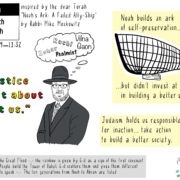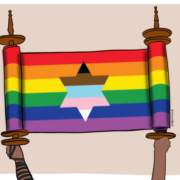The Graceful Lightness of Being / Graceful Masculinity: B’ha’alot’kha
 Part of a periodic Torah series on graceful masculinity and Jewish values.
Part of a periodic Torah series on graceful masculinity and Jewish values.
וַיֹּאמֶר מֹשֶׁה אֶל-יְהוָה, לָמָה הֲרֵעֹתָ לְעַבְדֶּךָ, וְלָמָּה לֹא-מָצָתִי חֵן, בְּעֵינֶיךָ: לָשׂוּם, אֶת-מַשָּׂא כָּל-הָעָם הַזֶּה–עָלָי.
Moses said to Hashem: “Why have you done evil to your servant, why haven’t I found favor in your eyes, that you place the burden of the entire people upon me?” (Numbers 11:11)
When we sense G-d’s closeness, our struggles feel holy, not heavy. As the clarity of our purpose increases, the internal resistance decreases – until the only opposition is coming from outside of us. When Adam and Eve were first created there was no doubt about who they were, in relationship to G-d. Then the snake came along and deceived them. By ingesting the forbidden fruit, they internalized the evil inclination and then needed to battle within themselves, to purge that voice of distraction that tries to divert our power away from goodness.
As G-d spoke this world into existence, through different utterances, the verses confirm “and it was so” “כן”, except for the creation of light where the word “כן” is missing. The rabbis explain that G-d was concerned that the light would be misused and so although G-d said “Let there be light”, G-d concealed and separated it for the righteous in the future (Chagigah 12a). This primordial light finds expression when Aharon lights the menorah and it is marked with the word “כן” (Emunas Eticha).
In the Genesis narrative, the word “light” (אור/ohr) is mentioned five times in the process of its formation. As a reference to that hidden light, we also find the word “ohr” five times in this week’s Torah portion. The light of the menorah also represents the light of the Torah and its wisdom, as the Talmud says: “the one who wants to be wise should face south” (Bava Basra 25b) for that is where the menorah was placed (Maharsha).
This wisdom, a consequence of the original light, is alluded to in the letter aleph (HaTzvi V’ Hatzadik) as the verse says (Job 33:33) וַאֲאַלֶּפְךָ֥ כְמָֽה. The letter aleph “א“ is formed with two pairs of a yud and a vuv – יוי – one on top and one on the bottom (Megaleh Amukos 164) having a numerical value of 32 and corresponding to the 32 paths of wisdom and the heart (lev לב), the source of this understanding.
Moses had a light that shone from his face, and according to Tikunei Zohar (Genesis 36b), it originated in the light from the garden. Moses achieved this by correcting the sin of Adam and replacing the ohr (skin עור) with ohr (light אור) restoring the prelapsarian partnership with G-d.
The Israelites had also acquired an elevated level, above the natural physical order, and were sustained by the mana. However, when they asked for meat, they no longer wanted to subside in such a spiritual plane and desired more physicality. They lowered themselves and created a separation from G-d, just as Adam and Eve did in the garden; desiring the desire for choice.
It is in this moment that Moses, as their teacher, feels the absence of this light and the subsequent weight of carrying the people without the same Divine assistance (R’ Vulli). The word for “found” in the phrase “Why haven’t I found favor in your eyes –וְלָמָּה לֹא-מָצָתִי חֵן בְּעֵינֶיךָ ” is missing the aleph (Iben Ezra). It was the people’s desire for meat that once again forced the exchange of the light for skin, and is alluded to in the word following “grace” “eynecha” literally “your eyes” but also meaning “your letter ע” (Yeytev Lev).
Having grace makes it easier for others to become close to us, and for us to be close to others. Knowing with certainty that G-d expects us to take care of one another, makes the desire for anything else no longer an option to choose from. While the work is still challenging, it is not burdensome. Feeling this partnership with G-d reminds us that with G-d’s help, nothing is impossible.

By R. Mike Moskowitz.









